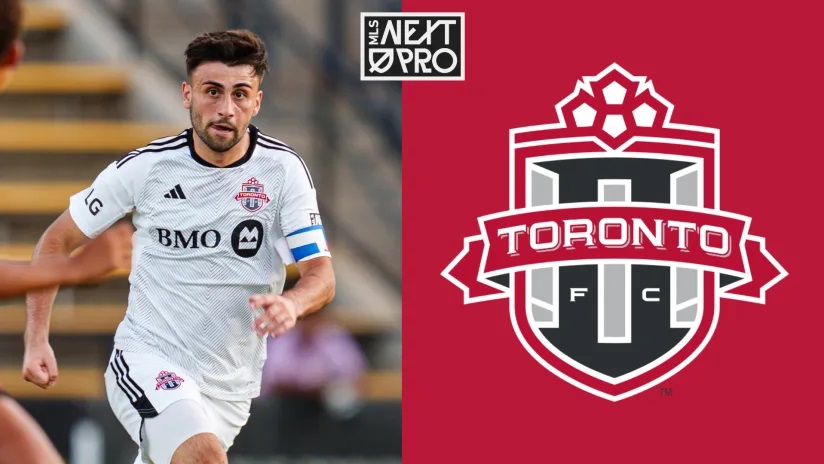BRAKING NEWS:Toronto FC II’s Challenging MLS Next Pro Season: Navigating the Path Forward

BREAKING NEWS:Toronto FC II’s Challenging MLS Next Pro Season: Navigating the Path Forward…..
Toronto FC II, the reserve team for Toronto FC in Major League Soccer, has recently wrapped up a demanding MLS Next Pro season filled with challenges and learning opportunities. As the team looks to reset and regroup, questions arise about its strategy, player development approach, and future trajectory. In this article, we’ll delve into the season’s highs and lows, analyze the team’s development, and explore what lies ahead for Toronto FC II.
A Season of Struggles and Development
Toronto FC II faced a challenging campaign in the 2024 MLS Next Pro season, finishing in the bottom tier of the standings. Their struggles mirrored those of their parent club, Toronto FC, who also experienced a tough season in MLS. The difficulties Toronto FC II encountered weren’t solely based on results but also extended to player development, tactical experimentation, and integration within the broader organizational structure.
1. Results and Performance Issues:
Toronto FC II ended the season with a poor win-loss record, falling short in critical matches and showing inconsistencies in both defense and attack. The lack of depth, exacerbated by player call-ups to the senior team, led to a rotating squad that struggled to maintain chemistry and cohesion on the field. This instability prevented Toronto FC II from establishing a strong foundation, leading to missed scoring opportunities and defensive lapses.
2. A Focus on Youth Development and Tactical Growth:
While results are often a critical aspect of any team’s season, Toronto FC II’s primary focus has always been on player development. As a reserve team, they serve as the proving ground for young talents looking to make their mark before stepping up to MLS. This season, however, some young players found themselves overwhelmed by the level of competition. Several promising players, such as Luka Gavran and Reshaun Walkes, showed potential but faced growing pains. Gavran, for example, demonstrated impressive shot-stopping skills but struggled with distribution and commanding the box – areas that require attention if he hopes to transition smoothly to the senior team.
Key Players and Emerging Talent
The season also provided opportunities for several players to showcase their skills and hint at their potential for Toronto FC’s future. Jayden Nelson, a dynamic forward, was a standout performer with his technical ability, pace, and eye for goal. Nelson’s performance wasn’t always consistent, but his flashes of brilliance reminded many of the talent pipeline Toronto FC has invested in.
Another notable player was Adam Pearlman, a midfielder who exhibited a strong work ethic and tactical versatility. Known for his box-to-box style, Pearlman was instrumental in the midfield, often tasked with linking defense and attack. His adaptability allowed him to cover multiple roles as required, making him an invaluable asset despite the team’s struggles. While still raw, Pearlman’s progression suggests he could be an essential player in Toronto FC’s setup.
Tactical Adjustments and Organizational Shifts
Toronto FC II’s tactical approach evolved over the season. Head Coach Gianni Cimini experimented with various formations, shifting from a standard 4-3-3 setup to a more flexible 3-5-2 system in an attempt to capitalize on the team’s pace and youthful energy. While these changes brought moments of brilliance, they also exposed the team’s lack of experience and defensive frailties, as younger players sometimes struggled to adapt to new roles.
Toronto FC has also been working to create a stronger alignment between the playing styles of the first team and the reserve team. This season saw more tactical discussions between the coaching staff of both teams, emphasizing a “play out from the back” philosophy that aligns with Toronto FC’s vision. However, implementing such an approach requires time, patience, and familiarity – factors that Toronto FC II, with its constantly shifting roster, struggled to achieve consistently this season.
Challenges in the Development Pipeline
While the reserve league format offers a valuable environment for player development, it also presents unique challenges. Toronto FC II experienced several call-ups to the senior squad this season, disrupting the team’s consistency and hindering chemistry-building efforts. Additionally, loan deals with other clubs for some players brought mixed results. Toronto FC II’s leadership is now tasked with balancing immediate team needs with the overarching goal of developing players for the first team.
The organization’s commitment to youth has also led to increased competition among players. Young talents are aware that every game is a proving ground, which adds pressure and can sometimes hinder performance, especially in high-stakes matches. This pressure can impact younger players’ confidence, making it crucial for the coaching staff to provide guidance and support to nurture them through the ups and downs of the season.
Building for the Future: Strategic Plans and Goals
1. Reinforcing the Squad with Experienced Talent:
One of Toronto FC II’s goals in the coming offseason is to add more seasoned players to their roster. By recruiting experienced players, the team hopes to create a more balanced and competitive environment, giving younger players mentorship on and off the field. This approach aligns with other successful MLS Next Pro teams, which often combine youth with experienced professionals to build a stable squad.
2. Strengthening the Defensive Core:
Toronto FC II’s defensive struggles were a recurring theme throughout the season. Addressing this issue is a top priority for the coaching staff, and offseason training will likely focus on defensive organization and positioning. Adding a seasoned defender could provide leadership at the backline and offer guidance to younger players.

3. A Strong Emphasis on Physical and Mental Conditioning:
Developing players who can meet the physical demands of MLS requires a strong emphasis on conditioning and injury prevention. Toronto FC II is expected to implement a more rigorous conditioning program to help players develop resilience and improve stamina. Mental conditioning is equally important, as the pressure of transitioning from a reserve team to the first team can take a toll on young players.
Expanding Youth Engagement and Community Connection
In an effort to build a stronger relationship between Toronto FC II and the local community, the team has ramped up its youth engagement programs. By fostering a sense of pride and ownership among young fans, Toronto FC II aims to cultivate a new generation of supporters. Additionally, the club has increased its partnerships with youth academies in the Toronto area, with the goal of providing a more direct pathway from local youth teams to Toronto FC II.
What’s Next for Toronto FC II?
Looking ahead, the team’s focus remains on development, but the front office is also aware of the importance of competitive results. Toronto FC II’s leadership is optimistic about the future and committed to creating a pathway to MLS for homegrown talent. They are set to continue investing in scouting, recruiting, and improving coaching facilities to stay competitive within the league.
A Revised Approach to Player Integration:
A key part of Toronto FC II’s future strategy will involve closer integration with the senior team. Toronto FC plans to create a more seamless pathway between the reserve team and the first team, allowing players to train with the senior squad regularly. By fostering stronger bonds between the two teams, the club hopes to make the transition smoother for young players.
Potential for Increased Investment in Facilities:
To improve training quality, Toronto FC II may invest in enhanced facilities and technology to aid in player analysis and injury prevention. Access to advanced analytics and data on player fitness, for instance, could allow the coaching staff to make more informed decisions about player rotation and rest. With MLS Next Pro’s competitive demands growing, the organization recognizes the need to provide the best possible resources to nurture and retain talent.

Leadership Development and Coaching Expansion:
Recognizing the value of strong leadership, Toronto FC II is also considering expanding its coaching staff. Adding specialized coaches for areas such as mental resilience and tactical discipline could help young players adjust to the high demands of professional soccer. Furthermore, additional mentorship programs could connect younger players with seasoned professionals, allowing them to benefit from the experience and wisdom of veterans who understand the challenges of the sport.
Final Thoughts: Navigating the Road Ahead
While Toronto FC II’s recent season may not have yielded the desired results, it provided valuable insights and opportunities for growth. Toronto FC II’s journey underscores the organization’s broader commitment to developing young talent and building a sustainable future for the club. Although the road ahead remains challenging, the organization’s proactive approach to addressing weaknesses and fostering growth offers hope for a stronger, more competitive team in the coming seasons.
With Toronto FC II investing in the next generation of soccer talent, fans and supporters can look forward to witnessing the rise of new stars, players who may one day shine on MLS stages and beyond. As the team takes on the upcoming offseason, the goal remains clear: nurture, develop, and prepare Toronto’s next soccer champions for a bright future in professional soccer.






